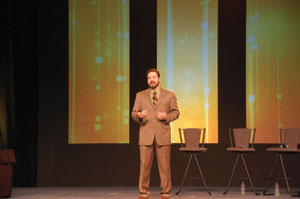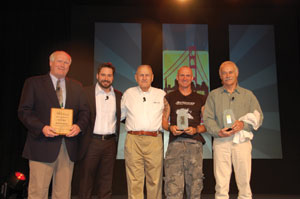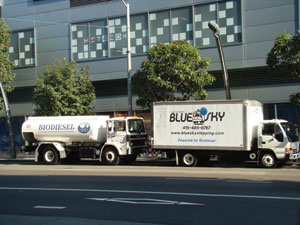A Recommitment to Unity:Overcoming Adversity by Leveraging Diversity




March 9, 2009
BY Ron Kotrba
At the onset of the 2009 National Biodiesel Conference in San Francisco, in early February, National Biodiesel Board Chief Executive Officer Joe Jobe discussed the "enormous adversity" the industry has endured over the past year. Without sugarcoating anything, Jobe acknowledged that it's been a struggle for producers to deal with two volatile commodity markets. He also addressed the Grocery Manufacturers Association's yearlong attack on biofuels. "The biodiesel industry is absolutely and irrefutably under attack by those trying to protect the status quo," he said. Once the GMA's campaign let up momentarily, the economy tumbled sending oil prices plummeting and ruining biodiesel blend economics. "Once again alternatives are being suffocated out of the market," Jobe said.
"The biodiesel industry is as diverse as America itself," he said. "We need to recommit to unity, and overcome adversity by leveraging our diversity." This was an important message for Jobe and he repeated it during the final general session as a call to action. "Our country is in a very serious situation," he said. It is time for a change, and the biodiesel industry needs to take advantage of the opportunity to help lead that change, Jobe told the audience. In addition to the economy, the biodiesel industry has many other challenges, which is why "we need to recommit to unity," he said.
The current wave of attacks on biofuels centers on indirect land use. Jobe said it's absurd to expect biofuels producers to have to account for this when no other industry has to do the same. "You can't include one variable for one industry yet exclude it for the others," he said. "This issue is poised to intentionally stack the deck in favor of petroleum. It is junk science. Unfortunately we have to take these attacks during such poor economic conditions. But we have truth and science on our side."
The session ended with a panel consisting of the "green team" for the city of San Francisco and the county, moderated by Randall von Wedel, who told the audience about their experiences over the years to get wide acceptance for biodiesel. Von Wedel is a principal scientist at CytoCulture International, a lab in the Bay Area. He also invented the pHLip Test, a 10 minute hand-held test to measure certain biodiesel qualities, and he has been instrumental in getting the city of San Francisco to accept biodiesel. The panel included San Francisco's Vandana Bali, of the Department of the Environment; Mike Ferry, Fire Department; Karri Ving, Public Utilities Commission; and Marty Mellera, San Francisco Municipal Transportation Agency. Before the panel and moderator left the stage, Jobe presented von Wedel with the NBB impact award for his years of work in biodiesel, especially for its acceptance in the Bay Area. Afterwards, industry partnership awards were given to Ronald Hayes, director of weights and measures for the Missouri Department of Agriculture, and Randy Jennings, biofuels administrator for the Tennessee Department of Agriculture.
Sustainability: The 'Defining Word of Our Time'
The theme of the second day's general session was sustainability, which NBB Chairman Ed Hegland called the "defining word of our time." He said the board's goal is to have biodiesel make up 5 percent of the national diesel fuel pool by 2015, a plan called 5x15.
Featured speaker Don O'Connor, president of (S&T)2 Consultants Inc., shared his insight into the indirect land-use issue. O'Connor discussed principals that he believes must be followed when life-cycle analysis and indirect land-use assessments are being developed. There must be relativity, transparency and priority of scientific approach, O'Connor said. "We will need to deviate from pure science," he said, meaning there will have to be projections, forecasts and inevitably the utilization of social sciences to develop sound indirect land-use assessments. O'Connor said there is uncertainty in understanding exactly how to identify and quantify variables in indirect land use. Quantifying indirect land use presents two significant challenges: determining how much production would rise from increased land use and evaluating the yield potential of more efficient farming practices. If one assumes more land is under cultivation somewhere, the location and type of that land needs to be known, he said, adding that some models being developed to address this issue don't include idle land. And once land, such as grasslands and rainforests, is identified, the status of that land should be included. Also, active farm lands have to be assessed to determine what kind of production techniques (e.g. till or no till) are employed on that land. O'Connor also said coproduct assessment is necessary. "There are lots of questions," he said. "And we have a long way to go before we reach a consensus."
O'Connor also said that those working toward developing how to calculate indirect land use should focus on the agricultural production gap that exists around the world. If soybean and rapeseed producing countries could reach production levels achieved in countries where the most advanced farming practices are used, approximately 7 billion more gallons of vegetable oil for biodiesel could be achieved without introducing one new acre into production. "And there are co-benefits of doing this," he said, adding that when agricultural production rises, poverty decreases. "We need higher ag prices," O'Connor said. Clearly, indirect effects of other fuels need to be addressed because it takes a lot of money and energy to ensure oil shipping lanes are safe. "Those [greenhouse gas emissions] are never factored in," he said. O'Connor concluded his presentation by reminding attendees that they are still in the early days of calculating indirect land use.
Emily Bockian Landsburg, chief executive officer of Philadelphia Fry-o-Diesel Inc. and chair of the NBB sustainability task force, told the audience about the formalized list of principles the task force developed to help guide the industry on issues of sustainability, which includes climate change mitigation, human rights, food security and respect for natural resources. "Keep in mind when making decisions, 'What are the externalities in this market?'" Bockian Landsburg said. "No one wants to profit from hardship."
Darryl Hannah, an actress and longtime biodiesel advocate, spoke about a documentary she's been working on, and about the state of the oceans, burning of rainforests, the "toxic patchwork" of unsustainable agriculture and biodiesel exports.
Melissa Etheridge, singer, songwriter and musician, entertained attendees and talked about how she came to be a biodiesel supporter.
Biodiesel Power on the High Seas
The final general session of the 2009 National Biodiesel Conference centered on the fantastic stories of two strikingly similar biodiesel-powered boat trips around the world separated by nearly two decades. Brian Peterson, captain of the Sunrider, piloted a rigid inflatable that ran on "soy diesel" in 1989, and Peter Bethune, captain of Earthrace, circumnavigated the globe 15 years later.
"In 1989, the word 'biodiesel' didn't exist," Peterson said. He set out to prove it worked by taking a boat trip around the world. He entered 35 ports in 25 countries in his biodiesel-powered boat. At each port, he would tell people about his journey. The trip took two years and two months, spanning 35,000 miles. He sold T-shirts to make money. Bethune's story of Earthrace is more familiar to today's generation of biodiesel followers. Both told stories of the powerful storms the oceans can muster, and the potential havoc they could wreak on such small vessels. Bethune stopped in 157 cities and endured 12 storms where he encountered 40-foot waves. "I only had a hundred hours of sea time when I started," Bethune said. "I was green." The Earthrace ship was designed to go through waves rather than float atop them like most boats. "It bombards your senses-the sheer violence and brutality," he said. "The seas are very unforgiving."
Peterson was asked how biodiesel has changed since his journey. "Well, it exists-you exist," he said, gesturing toward the crowd before him. Both gentlemen agreed, with Sunrider, the smallest vessel circumnavigating the globe on biodiesel, and Earthrace, the fastest, it was hard to argue that biodiesel was not reliable. They pondered the idea of ever wanting to give up the dream when times got rough. Bethune was moved by this, and became visibly emotional because Earthrace collided with an unlit fishing boat killing one of the fishermen. "If we weren't out here doing this," he said, obviously distraught, "someone wouldn't have died." Later, Peterson told the audience, "For some reason, you all find yourselves in this room talking about biodiesel-try explaining that," he chuckled. "Just don't stop, just keep going. You'll get to where your destiny takes you-it's that simple."
Bethune's words of encouragement were, "Stand up for what you believe in." Each of them was presented with the NBB Inspiration Award. The Pioneer Award was given to Kenlon Johannes, the first executive director of the National SoyDiesel Development Board, which later became the NBB.
Ron Kotrba is a Biodiesel Magazine senior writer. Reach him at rkotrba@bbiinternational.com or (701) 738-4942.
"The biodiesel industry is as diverse as America itself," he said. "We need to recommit to unity, and overcome adversity by leveraging our diversity." This was an important message for Jobe and he repeated it during the final general session as a call to action. "Our country is in a very serious situation," he said. It is time for a change, and the biodiesel industry needs to take advantage of the opportunity to help lead that change, Jobe told the audience. In addition to the economy, the biodiesel industry has many other challenges, which is why "we need to recommit to unity," he said.
The current wave of attacks on biofuels centers on indirect land use. Jobe said it's absurd to expect biofuels producers to have to account for this when no other industry has to do the same. "You can't include one variable for one industry yet exclude it for the others," he said. "This issue is poised to intentionally stack the deck in favor of petroleum. It is junk science. Unfortunately we have to take these attacks during such poor economic conditions. But we have truth and science on our side."
The session ended with a panel consisting of the "green team" for the city of San Francisco and the county, moderated by Randall von Wedel, who told the audience about their experiences over the years to get wide acceptance for biodiesel. Von Wedel is a principal scientist at CytoCulture International, a lab in the Bay Area. He also invented the pHLip Test, a 10 minute hand-held test to measure certain biodiesel qualities, and he has been instrumental in getting the city of San Francisco to accept biodiesel. The panel included San Francisco's Vandana Bali, of the Department of the Environment; Mike Ferry, Fire Department; Karri Ving, Public Utilities Commission; and Marty Mellera, San Francisco Municipal Transportation Agency. Before the panel and moderator left the stage, Jobe presented von Wedel with the NBB impact award for his years of work in biodiesel, especially for its acceptance in the Bay Area. Afterwards, industry partnership awards were given to Ronald Hayes, director of weights and measures for the Missouri Department of Agriculture, and Randy Jennings, biofuels administrator for the Tennessee Department of Agriculture.
Sustainability: The 'Defining Word of Our Time'
The theme of the second day's general session was sustainability, which NBB Chairman Ed Hegland called the "defining word of our time." He said the board's goal is to have biodiesel make up 5 percent of the national diesel fuel pool by 2015, a plan called 5x15.
Featured speaker Don O'Connor, president of (S&T)2 Consultants Inc., shared his insight into the indirect land-use issue. O'Connor discussed principals that he believes must be followed when life-cycle analysis and indirect land-use assessments are being developed. There must be relativity, transparency and priority of scientific approach, O'Connor said. "We will need to deviate from pure science," he said, meaning there will have to be projections, forecasts and inevitably the utilization of social sciences to develop sound indirect land-use assessments. O'Connor said there is uncertainty in understanding exactly how to identify and quantify variables in indirect land use. Quantifying indirect land use presents two significant challenges: determining how much production would rise from increased land use and evaluating the yield potential of more efficient farming practices. If one assumes more land is under cultivation somewhere, the location and type of that land needs to be known, he said, adding that some models being developed to address this issue don't include idle land. And once land, such as grasslands and rainforests, is identified, the status of that land should be included. Also, active farm lands have to be assessed to determine what kind of production techniques (e.g. till or no till) are employed on that land. O'Connor also said coproduct assessment is necessary. "There are lots of questions," he said. "And we have a long way to go before we reach a consensus."
O'Connor also said that those working toward developing how to calculate indirect land use should focus on the agricultural production gap that exists around the world. If soybean and rapeseed producing countries could reach production levels achieved in countries where the most advanced farming practices are used, approximately 7 billion more gallons of vegetable oil for biodiesel could be achieved without introducing one new acre into production. "And there are co-benefits of doing this," he said, adding that when agricultural production rises, poverty decreases. "We need higher ag prices," O'Connor said. Clearly, indirect effects of other fuels need to be addressed because it takes a lot of money and energy to ensure oil shipping lanes are safe. "Those [greenhouse gas emissions] are never factored in," he said. O'Connor concluded his presentation by reminding attendees that they are still in the early days of calculating indirect land use.
Emily Bockian Landsburg, chief executive officer of Philadelphia Fry-o-Diesel Inc. and chair of the NBB sustainability task force, told the audience about the formalized list of principles the task force developed to help guide the industry on issues of sustainability, which includes climate change mitigation, human rights, food security and respect for natural resources. "Keep in mind when making decisions, 'What are the externalities in this market?'" Bockian Landsburg said. "No one wants to profit from hardship."
Darryl Hannah, an actress and longtime biodiesel advocate, spoke about a documentary she's been working on, and about the state of the oceans, burning of rainforests, the "toxic patchwork" of unsustainable agriculture and biodiesel exports.
Melissa Etheridge, singer, songwriter and musician, entertained attendees and talked about how she came to be a biodiesel supporter.
Biodiesel Power on the High Seas
The final general session of the 2009 National Biodiesel Conference centered on the fantastic stories of two strikingly similar biodiesel-powered boat trips around the world separated by nearly two decades. Brian Peterson, captain of the Sunrider, piloted a rigid inflatable that ran on "soy diesel" in 1989, and Peter Bethune, captain of Earthrace, circumnavigated the globe 15 years later.
"In 1989, the word 'biodiesel' didn't exist," Peterson said. He set out to prove it worked by taking a boat trip around the world. He entered 35 ports in 25 countries in his biodiesel-powered boat. At each port, he would tell people about his journey. The trip took two years and two months, spanning 35,000 miles. He sold T-shirts to make money. Bethune's story of Earthrace is more familiar to today's generation of biodiesel followers. Both told stories of the powerful storms the oceans can muster, and the potential havoc they could wreak on such small vessels. Bethune stopped in 157 cities and endured 12 storms where he encountered 40-foot waves. "I only had a hundred hours of sea time when I started," Bethune said. "I was green." The Earthrace ship was designed to go through waves rather than float atop them like most boats. "It bombards your senses-the sheer violence and brutality," he said. "The seas are very unforgiving."
Peterson was asked how biodiesel has changed since his journey. "Well, it exists-you exist," he said, gesturing toward the crowd before him. Both gentlemen agreed, with Sunrider, the smallest vessel circumnavigating the globe on biodiesel, and Earthrace, the fastest, it was hard to argue that biodiesel was not reliable. They pondered the idea of ever wanting to give up the dream when times got rough. Bethune was moved by this, and became visibly emotional because Earthrace collided with an unlit fishing boat killing one of the fishermen. "If we weren't out here doing this," he said, obviously distraught, "someone wouldn't have died." Later, Peterson told the audience, "For some reason, you all find yourselves in this room talking about biodiesel-try explaining that," he chuckled. "Just don't stop, just keep going. You'll get to where your destiny takes you-it's that simple."
Bethune's words of encouragement were, "Stand up for what you believe in." Each of them was presented with the NBB Inspiration Award. The Pioneer Award was given to Kenlon Johannes, the first executive director of the National SoyDiesel Development Board, which later became the NBB.
Ron Kotrba is a Biodiesel Magazine senior writer. Reach him at rkotrba@bbiinternational.com or (701) 738-4942.
Advertisement
Advertisement
Upcoming Events





